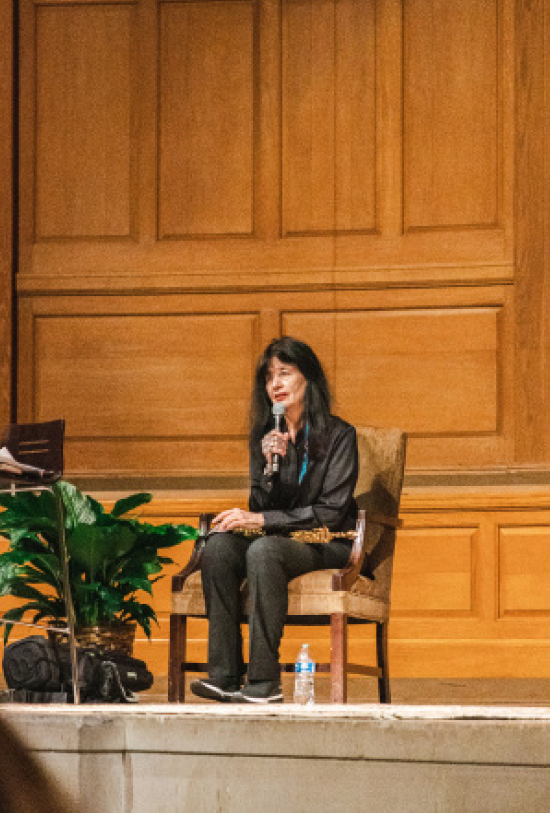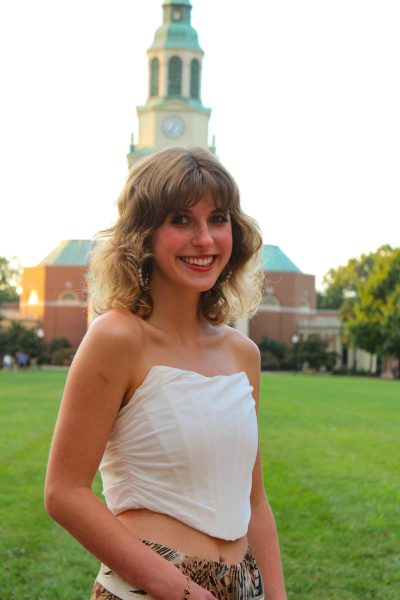Joy Harjo’s poetry sparks discussions on environment
The Poet Laureate spoke at Wake Forest last week
Harjo, citizen of the Muscogee (Creek) Nation, is the first Native American to serve as U.S. Poet Laureate.
February 3, 2022
Even the trees outside of Wait Chapel craned their listening branches outwards to hear as Joy Harjo passionately performed her ecocentric poetry and music on Thursday evening.
Harjo is an internationally renowned performer and writer of the Muscogee (Creek) Nation and has authored nine books of poetry. In 2019, Harjo was named the 23rd poet laureate of the United States, the first Native American to hold the position. Harjo was appointed to another one-year term in 2020, and in 2021 she became the second-ever poet laureate to serve three consecutive terms.
Hosted by Wake Forest’s Office of Sustainability, Harjo’s visit to Wake Forest last week drew in large groups of excited students and faculty to her performance of poetry, music and song in Wait Chapel. Harjo thematically explores the lyrical dance between nature and humanity, climate change and politics, and modern and ancient Native American folklore in her poetry.
“We need food for our minds and spirits just as much as we need it for our bodies,” Harjo said within the first few minutes of being onstage. “That’s where poetry comes in.”
Early on in the presentation, the chapel fell silent as Harjo produced a flute and breathed life into the instrument. Mesmerizing earthy tones filled the high ceilings within an ancient-sounding tune. In the hush following the end of the song, Harjo read aloud her poem, “For Calling the Spirit Back from Wandering the Earth in Its Human Feet”. The poem begins:
“Put down that bag of potato chips, that white bread, that bottle of pop.
Turn off that cellphone, computer, and remote control.
Open the door, then close it behind you.
Take a breath offered by friendly winds. They travel the earth gathering essences of plants to clean.
Give it back with gratitude.”
Senior Sakina Barthe-Sukhera is an Office of Sustainability garden intern and volunteered as an usher at the event. She also attended Joy Harjo’s writing workshop class at Wake Forest earlier in the week. Last year, Barthe-Sukhera was instrumental in managing Tohi Talks at the Tohi garden in honor of Native American Heritage Month. Given her extensive experience on the topic, she was excited to explore new facets of indigenous environmentalism – in this case, poetry.
“Poetry often uses metaphors, a tool that can help us view things in a different perspective,” Barthe-Sukhera said. “Using things like metaphors to understand the environment in a different way can be really beneficial — it helps us empathize with the earth, in a way.”
Senior Karl Gustafson, who is also an Office of Sustainability garden intern, added: “Take climate change, for instance. There are so many different perspectives you encounter on that one topic. Just like [Joy Harjo] said, poetry can be a way of bridging all those perspectives into a meaningful work of art.”
Professor Lucy Alford is the Assistant Professor of Literature in the English Department at Wake Forest. She said that, through her poetry, Joy Harjo defamiliarized what were once familiar topics to her: space, time, and the Earth.
“As she was reading, I kept thinking about spatial presence and time, and the uncertainties and the vulnerabilities that are very much of this moment when we think about the state of our planet.” Alford said. “Her poetry is somehow inhabiting this present moment of looking forward to the future and offering guidance for how we might act, but then also reaching back and tapping into this much longer history.”
In her poem, “Speaking Tree”, Harjo plays with the idea of trees having conscious, sentient thought. At the event on Thursday, she shared that her inspiration for this poem came to her after a very unusual dream; after hugging a giant, beautiful tree, it bent its trunk over and said to her, “Thank you for being aware of us.” After the dream, Harjo became curious about the possibility of a “shared consciousness” in nature and wondered whether the individual units of nature might really just be living the “lives of the earth” in different ways of experiencing, and of knowing.
“[Harjo] evoked this sense of both being here in the present and trying to attend to the living and fragile nature of the Earth. But she also mentioned in her poem “Speaking Tree” that the lives of the earth – whether that be through the rivers, trees, ants, or humans – are all intertwined and will continue on into the future.” Alford said.
As Harjo mentioned in her talk, there is a deep, ancestral knowledge within indigenous cultures relating to managing and caring for lands. In the past few decades, indigenous groups have received more recognition for their effective ecological practices. At the 1992 Earth Summit, the United Nations recognized that indigenous peoples and their communities have a critical role to play in managing and developing the environment.
Furthermore, the U.N. stated that indigenous peoples are also among the first to face the direct consequences of climate change, due to their dependence upon, and close relationship, with the environment and its resources.
“There is a Native American story that says, our people (indigenous peoples) will save the world with our knowledge one day.” Harjo said near the end of her talk. “That humans all over the world — all races — will come to need our ways of knowing, our ways of caring for the earth, to save us from environmental downfall.”
The intersection between poetry and environmental activism is not always clear, however. Poetry is an art form, Harjo pointed out, and can be interpreted however the person experiencing it wants to understand it as.
Although Harjo frequently explores the connection between people and the earth in her poetry, she hopes that her words can inspire interhuman connection as well. Poetry, in Joy Harjo’s eyes, is paramount to the survival of humanity.
“A culture without art,” Harjo said, “is a dying culture.”
Harjo continued: “In Native American prayers, when we gather together and say the prayer, we always include everybody in our prayer, meaning all of the human race. We are all one people.”















